How to start saving money
Lorem ipsum dolor sit amet, consectetur adipiscing elit lobortis arcu enim urna adipiscing praesent velit viverra sit semper lorem eu cursus vel hendrerit elementum morbi curabitur etiam nibh justo, lorem aliquet donec sed sit mi dignissim at ante massa mattis.
- Neque sodales ut etiam sit amet nisl purus non tellus orci ac auctor
- Adipiscing elit ut aliquam purus sit amet viverra suspendisse potent
- Mauris commodo quis imperdiet massa tincidunt nunc pulvinar
- Excepteur sint occaecat cupidatat non proident sunt in culpa qui officia
Why it is important to start saving
Vitae congue eu consequat ac felis placerat vestibulum lectus mauris ultrices cursus sit amet dictum sit amet justo donec enim diam porttitor lacus luctus accumsan tortor posuere praesent tristique magna sit amet purus gravida quis blandit turpis.

How much money should I save?
At risus viverra adipiscing at in tellus integer feugiat nisl pretium fusce id velit ut tortor sagittis orci a scelerisque purus semper eget at lectus urna duis convallis. porta nibh venenatis cras sed felis eget neque laoreet suspendisse interdum consectetur libero id faucibus nisl donec pretium vulputate sapien nec sagittis aliquam nunc lobortis mattis aliquam faucibus purus in.
- Neque sodales ut etiam sit amet nisl purus non tellus orci ac auctor
- Adipiscing elit ut aliquam purus sit amet viverra suspendisse potenti
- Mauris commodo quis imperdiet massa tincidunt nunc pulvinar
- Adipiscing elit ut aliquam purus sit amet viverra suspendisse potenti
What percentege of my income should go to savings?
Nisi quis eleifend quam adipiscing vitae aliquet bibendum enim facilisis gravida neque. Velit euismod in pellentesque massa placerat volutpat lacus laoreet non curabitur gravida odio aenean sed adipiscing diam donec adipiscing tristique risus. amet est placerat in egestas erat imperdiet sed euismod nisi.
“Nisi quis eleifend quam adipiscing vitae aliquet bibendum enim facilisis gravida neque velit euismod in pellentesque”
Do you have any comments? Share them with us on social media
Eget lorem dolor sed viverra ipsum nunc aliquet bibendum felis donec et odio pellentesque diam volutpat commodo sed egestas aliquam sem fringilla ut morbi tincidunt augue interdum velit euismod eu tincidunt tortor aliquam nulla facilisi aenean sed adipiscing diam donec adipiscing ut lectus arcu bibendum at varius vel pharetra nibh venenatis cras sed felis eget.
Tracking a car with GPS technology offers precise location tracking that can be accessed in real time. This provides security and peace of mind.
A reliable car GPS tracker allows users to monitor their vehicle’s location, receive alerts for unauthorized movements, and review trip history using an app or web platform. This makes it an effective tool for preventing theft and monitoring teen drivers or fleet vehicles.

Many GPS trackers offer features such as geofencing, speed alerts, and vehicle health monitoring. Users should consider battery life, subscription costs, and legal restrictions when choosing a device.
These factors help ensure the tracker fits their needs while complying with local laws.
How GPS Car Tracking Works

A car GPS tracker uses satellite signals and electronic components to provide accurate, real-time location data. It processes and transmits information continuously for monitoring the vehicle’s position and movements.
The technology combines hardware, software, and communication networks.
Understanding GPS Technology
GPS stands for Global Positioning System. It relies on a network of satellites orbiting the Earth.
Each satellite broadcasts signals that a GPS tracking device receives at the same time. The device calculates its position using trilateration, measuring distances from at least three satellites.
This determines the car’s latitude, longitude, and altitude. GPS technology offers global coverage and works anywhere with a clear sky view.
Data from satellites is processed instantly, enabling continuous location updates. The system was originally developed for military use but now supports civilian vehicle tracking.
How Car GPS Trackers Operate
Car GPS trackers contain a receiver, a microprocessor, and a communication module. The receiver captures satellite signals to determine the vehicle’s location.
The microprocessor processes this position data. The communication module sends location updates to a server or mobile app using cellular or satellite networks.
Users can access the car’s current position, speed, and direction in real time. Many trackers include geofencing alerts, engine diagnostics, and driving behavior monitoring.
These functions enhance security, theft recovery, and driver safety.
Types of GPS Tracking Devices
There are several types of car GPS trackers:
- Hardwired Trackers: Installed directly into the vehicle’s electrical system. They offer constant power and are less likely to be removed.
- Portable Trackers: Battery-powered units that can be moved between vehicles. They are easy to install but require regular charging.
- OBD Trackers: Plug into the car’s On-Board Diagnostics port. They access vehicle data while tracking location.
Each type balances ease of use, power source reliability, and the level of information provided. Selection depends on user needs for permanence, accuracy, and extra features.
Key Features of Car GPS Trackers

Car GPS trackers offer features that improve vehicle security and driver monitoring. These include precise location tracking, notification of unusual behavior, and detailed records of vehicle movement.
Real-Time Location Tracking
Real-time location tracking provides continuous updates on the vehicle’s position using satellite navigation. This is usually accessible through a smartphone app or web portal.
This feature is crucial for theft prevention and recovery. It supports accurate tracking during emergencies or unauthorized use.
Some systems display vehicle speed and direction in real time. GPS tracking often includes instant updates, with location refreshed every few seconds or minutes.
Geofencing and Geofence Alerts
Geofencing lets users define virtual boundaries on a map. When the vehicle enters or exits these areas, the tracker sends automatic alerts to the owner.
This feature is valuable for fleet managers and parents monitoring teen drivers. It ensures vehicles remain within safe or authorized zones.
Geofence alerts can be customized for specific times and days. Alerts are commonly sent via app notifications, SMS, or email.
Speed Alerts and Notifications
Speed alerts notify users if the vehicle exceeds preset speed limits. This helps monitor driver behavior and supports safe driving.
The tracker can send instant notifications about speed violations. It also assists fleet operators in managing risks.
Some devices offer braking or acceleration alerts. These features provide a fuller picture of driving habits.
Tracking History and Route History
Tracking history stores data on the vehicle’s past locations and movements. Users can review route history via interactive maps.
This feature supports reports on trip duration, start and stop times, and distances covered. It is useful for verifying driver activity and auditing routes.
Data retention periods vary by provider. Access to historical data can help investigate accidents by reconstructing vehicle movements.
Benefits of Using a GPS Car Tracker

A GPS car tracker helps improve vehicle safety and operational efficiency. It supports quick responses to security threats and helps manage multiple vehicles.
Vehicle Security and Theft Recovery
GPS car trackers improve vehicle security by offering real-time location tracking. If a car is stolen, the owner or authorities can find its position quickly.
Many trackers include geo-fencing features that alert owners when a vehicle leaves a designated area. These notifications help detect unauthorized movement early.
Some systems integrate with immobilizers to remotely disable the engine. The visible presence of a tracker can also deter potential thieves.
Fleet Management and Monitoring
For businesses, GPS car trackers enable precise fleet management by monitoring multiple vehicles at once. This real-time visibility helps optimize routes and reduce fuel consumption.
Managers can schedule maintenance based on mileage and usage data. The technology supports dispatching decisions with live traffic updates.
Automated reports on vehicle location and status reduce administrative workload. This streamlines operations and helps save costs.
Driver Behavior and Vehicle Diagnostics
GPS car trackers offer insights into driver behavior, such as speed and harsh braking. Monitoring these metrics encourages safer driving.
Some systems also track engine hours and diagnostic codes. Early detection of mechanical issues prevents costly repairs.
By combining behavioral data with vehicle performance, GPS tracking supports better management. This leads to improved safety and lower maintenance costs.
Types of Car GPS Trackers

Car GPS trackers come in different designs to suit distinct needs. Each type offers varying installation processes, power sources, and tracking capabilities.
Hardwired Trackers
Hardwired GPS trackers connect directly to the vehicle’s electrical system. They are usually installed under the dashboard or near the fuse box.
These trackers provide continuous power and real-time location updates. They often include advanced features like geofencing and ignition alerts.
Installation usually requires professional help. The main drawback is the permanent installation, making it hard to move between vehicles.
However, hardwired devices are highly secure against tampering and theft.
OBD-II Plug-In Devices
OBD-II plug-in trackers connect to the car’s diagnostic port, usually under the dashboard. They draw power directly from the vehicle and do not need extra wiring.
This type is favored for its easy installation and quick setup. Besides location tracking, it can access diagnostic information like engine status.
OBD-II trackers only work when plugged in and may lose connection if the port is disabled. They are generally less discreet than hardwired units.
Battery-Powered and Portable Options
Battery-powered GPS trackers run on internal rechargeable or replaceable batteries. This design allows flexible placement anywhere in or on the car.
Portable devices are useful for temporary use or for vehicles without easy access to OBD-II ports. Many models can last days to weeks before needing a recharge.
Users should consider battery life, as shorter spans require regular charging. These trackers often include motion sensors to save power by activating only when the vehicle moves.
Best Car GPS Trackers in 2025
Accurate vehicle tracking requires reliable hardware, real-time data, and user-friendly software. The following GPS trackers offer features such as long battery life, live updates, and easy installation.
Spytec GPS GL300
The Spytec GPS GL300 is known for its compact size and accurate real-time tracking. It provides location updates every 5 seconds and supports mobile and web app access.
The device offers geofencing, sending alerts when the vehicle enters or leaves designated areas. Its battery lasts up to two weeks with typical use.
It supports nationwide coverage on cellular networks, which improves reliability in different locations. The GL300 balances price and features, making it a popular choice for many users.
Bouncie GPS Tracker
Bouncie focuses on driver behavior and vehicle diagnostics, as well as tracking location. The device plugs into the vehicle’s OBD-II port and provides real-time vehicle health status and trip history.
It updates location every 15 seconds. Alerts are included for speeding, hard braking, and rapid acceleration.
The monthly subscription is affordable. The app interface is simple and works well for parents monitoring new drivers.
While it connects to the OBD-II port, the tracker provides detailed data beyond just location. This helps improve driver safety and manage vehicle performance.
Americaloc GL300
The Americaloc GL300 is similar to the Spytec GL300 in design and function but offers a few unique advantages. It provides real-time GPS tracking with location updates every 60 seconds to save battery.
A key feature is the option to add a backup SIM card for tracking during network outages. Battery life can last up to two weeks on a full charge with moderate use.
Americaloc offers strong geofencing and alerts on both mobile and desktop. The compact build and magnetic case make it ideal for stealth tracking.
Optimus 2.0 GPS Tracker
Optimus 2.0 is easy to use and reliable. It features plug-and-play installation with a magnetic case for attaching under the vehicle.
It provides precise real-time tracking with automatic movement alerts. The reporting frequency can be adjusted by the user.
Notifications are sent for ignition on and off events. The device includes a cloud-based platform accessible by app or browser.
Battery life averages around 7 days, which is shorter than GL300 models. The simple setup makes it appealing for users who want quick deployment.
It is a good choice for those who value ease and flexibility.
Choosing the Right GPS Tracker for Your Needs
Choosing a GPS car tracker depends on features, cost, installation, power needs, and service quality. Each factor affects how well the device meets specific tracking needs, such as theft recovery or monitoring teen drivers.
Comparing Features and Subscription Fees
Important features include real-time tracking accuracy, geofencing alerts, speed notifications, and historical route data. Some trackers offer smartphone app integration for easy monitoring.
Subscription fees vary and depend on data plans and included services. Devices with more features usually have higher monthly costs.
A simple comparison:
FeatureBasic TrackerAdvanced TrackerReal-time updates5-15 min intervalsLive streamingAlertsTheft onlyMultiple customizable alertsApp supportLimitedFull-featured appSubscription fee$5-$10/month$15-$30/month
Users should decide if extra features are worth the higher fees.
Installation and Ease of Use
Installation type affects convenience and effectiveness. The main types are:
- OBD-II port trackers plug into the car’s diagnostics port. They are easy to use but only work with certain vehicles.
- Hardwired trackers connect directly to the vehicle’s power supply. They can be hidden and offer constant power but need professional installation.
- Battery-powered and portable trackers do not need wiring but require charging. They are flexible for temporary or multiple vehicles.
Ease of use also depends on how clear the app interface is and how quickly alerts are received. A user-friendly app makes setup and daily use easier.
Battery Life and Maintenance
Battery life is important for portable GPS trackers that are not connected to the vehicle’s power. Longer battery life means less frequent charging.
Most devices last from one week to several months, depending on how often they report location. Less frequent updates use less power.
Hardwired or OBD-II trackers draw power from the vehicle, so battery life is less of an issue. Portable trackers should have low-battery alerts to avoid downtime.
Maintenance includes checking for damage, updating firmware, and monitoring battery health, especially for long-term use.
Service Coverage and Support
Reliable coverage depends on the tracker’s cellular network compatibility and the user’s location. Some trackers offer nationwide or international tracking, which is important for frequent travelers.
Before buying a GPS tracking device, users should check which carrier networks it supports. They should also confirm that service is available where they plan to use it.
Customer support quality can vary between providers. Responsive support is helpful for solving problems and getting device updates.
Review service contracts for details on contract length, cancellation policies, and extra fees. This helps avoid unexpected charges.



